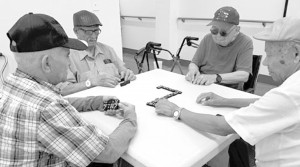Tips for keeping your aging mind sharp and avoiding dementia
2nd October 2017 · 0 Comments
By Tibisay Zea
Contributing Writer
(Special from LaPlaneta/New America Media) — Raise your hand if you have a friend or relative who suffers or has suffered from some form of dementia, such as Alzheimer’s disease.
The data suggest that this is one of the most common conditions in the world, bringing severe brain debilitation and other consequences associated with isolation and depression. The key question is, can we prevent this from happening? Fortunately, science tells us yes—and the sooner we start, the better.
A group of scientists, physicians and mental health experts from the Global Council on Brain Health recently met in Washington, D.C. to make recommendations on how to forestall mental deterioration as we age.
Little Evidence on Brain Games
The Global Council also concluded that there are many popular but erroneous misconceptions about claims having little scientific basis. Most common are so-called brain games promising to help us improve mental abilities. However, there is little evidence on this. For instance, playing Sudoku or crossword puzzles over time will make us better at Sudoku or crosswords, but won’t necessarily keep our mind agile on other activities.
In contrast, knowledge accumulated over time seems to play an important role in coping with the onset of dementia. “Frequent and continuous learning teaches the brain to modify its neural activity to meet the challenge of facing a new situation,” said Sarah Lock, senior vice president of policy at AARP.
According to Lock, learning a new skill, such as dancing, drawing, speaking a new language or playing an instrument, or training untapped cognitive functions, for example through brain training, gives the brain the ability to rewire its neural circuits.
The Alzheimer’s Association points out that in the United States more than five million Americans have dementia. By 2050 this figure could rise to 16 million.
In addition, scientific research has confirmed that Latinos are more likely to suffer dementia than whites. Nearly 12 percent of older Hispanics have been diagnosed with dementia in the United States, according to the Alzheimer’s Association. Key factors are lower socioeconomic status, including low levels of education, higher poverty rates, and a greater tendency for early exposure to adversity and discrimination. Medicare data show that 11.5 percent of Hispanics age 65-plus have been diagnosed with dementia, compared with 6.9 percent of whites, and 9.4 percent of African Americans.
“Latinos have almost twice the risk of developing Alzheimer’s disease, which has no cure. The people who suffer from it will completely lose their memory,” said Yakeel Quiroz, a neuropsychologist from the Massachusetts General Hospital.
What Can We Do?
The Global Council on Brain Health report issued a series of recommendations. They include:
Look for new activities that present a challenge and may help you develop new skills, then incorporate them into your day to day. Examples are practicing tai-chi, taking photography classes, learning a new language, playing an instrument, practicing a different physical activity.
Find someone else to do these activities with, such as a friend or family member. This is key to inspiring you to continue with your efforts. Generally, being with other people motivates you.
Do not wait long before you start challenging your mind with stimulating activities. The younger you start, the better your chance of having your brain in good shape as you get older.
Choose an activity you enjoy. This will make it easier to be motivated and committed for years to come.
Select activities that fit your schedule and are easily accessible, so you can be consistent.
Do things that involve both physical and mental activity. Physical activity has been shown to improve cognitive skills, for instance, dancing or playing tennis.
Myths & Facts About Dementia
MYTH: We were born with all the neurons that our mind will always have.
FACT: While many of the neurons are created before birth, some areas of the brain create new neurons throughout life in a process called neurogenesis. For example, some studies have shown that new neurons can be created in the brain region involved in learning and memory.
MYTH: You cannot learn something new when you are older.
FACT: There are many simple ways in which you can stimulate the mind to learn new things. For example, something as simple as meeting new people involves learning new names or other relevant information. Another idea might be to learn how to cook different dishes, which involves memorizing ingredients and being attentive to new cooking instructions.
MYTH: Only young people can learn a new language.
FACT: It is true that young people who are exposed to a new language can usually achieve faster and better results than older adults. However, people can learn a language at any age if they set their minds to it and find conditions conducive to learning.
MYTH: Dementia is an inevitable consequence of aging.
FACT: Although it is a very common condition, dementia cannot be termed as a “normal” element of aging. The loss of cognitive abilities is associated with age, but there is a distinction between that and some abnormal changes—which in some cases may progress to dementia.
Tibisay Zea produced this article in Spanish for Boston’s La Planeta with the support of a journalism fellowship from New America Media, the Gerontological Society of America and the Silver Century Foundation.
This article originally published in the October 2, 2017 print edition of The Louisiana Weekly newspaper.



